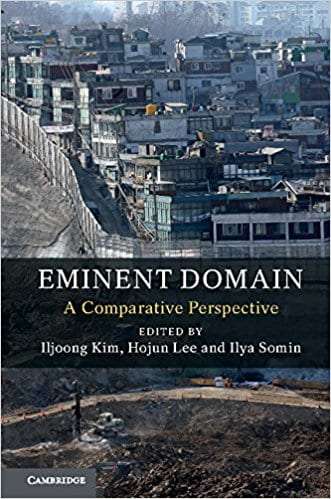Guest-blogging by contributors to "Eminent Domain: A Comparative Perspective"

I am pleased to announce that several contributors to my new book Eminent Domain: A Comparative Perspective (co-edited with Iljoong Kim and Hojun Lee) will be guest-blogging here at the Volokh Conspiracy this week.
The book was just published by Cambridge University Press. It analyzes the use and abuse of eminent domain in a number of nations around the world, including the United States, Germany, Taiwan, a variety of developing nations, and South Korea. This project arose from a conference sponsored by the Korea Development Institute (one of Korea's leading research institutes), and includes several chapters devoted to the use of eminent domain in South Korea, whose record has attracted interest from policymakers in many other nations.
The guest-bloggers will be Hojun Lee of the Korea Development Institute (one of the book's co-editors, and author of a chapter on eminent domain in South Korea), Hans-Bernd Schäfer (Bucerius University, one of Europe's leading law and economics scholars and author of the chapter on Germany), and Yun-chien Chiang (Academia Sinica, one of the world's leading experts on takings, and author of the chapter on eminent domain in Taiwan). I reviewed Yun-Chien's excellent book on takings compensation here.
Here is a summary of the book:
The taking of private property for development projects has caused controversy in many nations, where it has often been used to benefit powerful interests at the expense of the general public. This edited collection is the first to use a common framework to analyze the law and economics of eminent domain around the world. The authors show that seemingly disparate nations face a common set of problems in seeking to regulate the condemnation of private property by the state. They include the tendency to forcibly displace the poor and politically weak for the benefit of those with greater influence, disputes over compensation, and resort to condemnation in cases where it destroys more economic value than it creates. With contributions from leading scholars in the fields of property law and economics, the book offers a comparative perspective and considers a wide range of possible solutions to these problems.
In this post about the book at the Cambridge University Press blog, I described the origins of the book, and how I gradually came to realize the global dimension of the debate over eminent domain:
For what purposes should the government be able to take private property? When I first started writing about that question, I thought there was little chance anyone outside the United States would ever be interested in my work. Most of my scholarship in that area focused on the Fifth Amendment requirement that takings must be for a "public use," and the ways in which American courts have often neglected it. In 2005, the US Supreme Court decided Kelo v. City of New London, a controversial 5-4 ruling in which the majority concluded that a "public use" could be almost anything the government says it is, and upheld the taking of fifteen homes in order to transfer them to a new private owner, so as to enhance "economic development." Kelo generated widespread outrage in the United States, and rekindled a debate over the law and policy of takings, which I chronicled in my book The Grasping Hand.
But, to my surprise, the American debate over Kelo generated widespread interest abroad, as well. I was contacted by scholars and journalists as far away as China, France, and South Korea. The Kelo case struck a chord in these and other countries because they have been grappling with many of the same issues as we had….
I was not the first scholar to notice these similarities….
Although there is considerable variation between the nations covered in the book, we also found some important commonalities. In a variety of nations, eminent domain is often used in ways that benefit politically influential groups at the expense of the poor and the politically weak. The pattern familiar from the sad history of "blight" and economic development takings in the United States also recurs in many other countries. Similarly, in many countries, the compensation paid to property owners whose land is condemned is often inadequate, falling well below the true magnitude of their losses. Not surprisingly, political controversy over takings and public revulsion against abuses has arisen in a variety of countries….
In addition to co-editing the book, I also wrote the chapter on eminent domain in the United States, which I will blog about later in the week.
